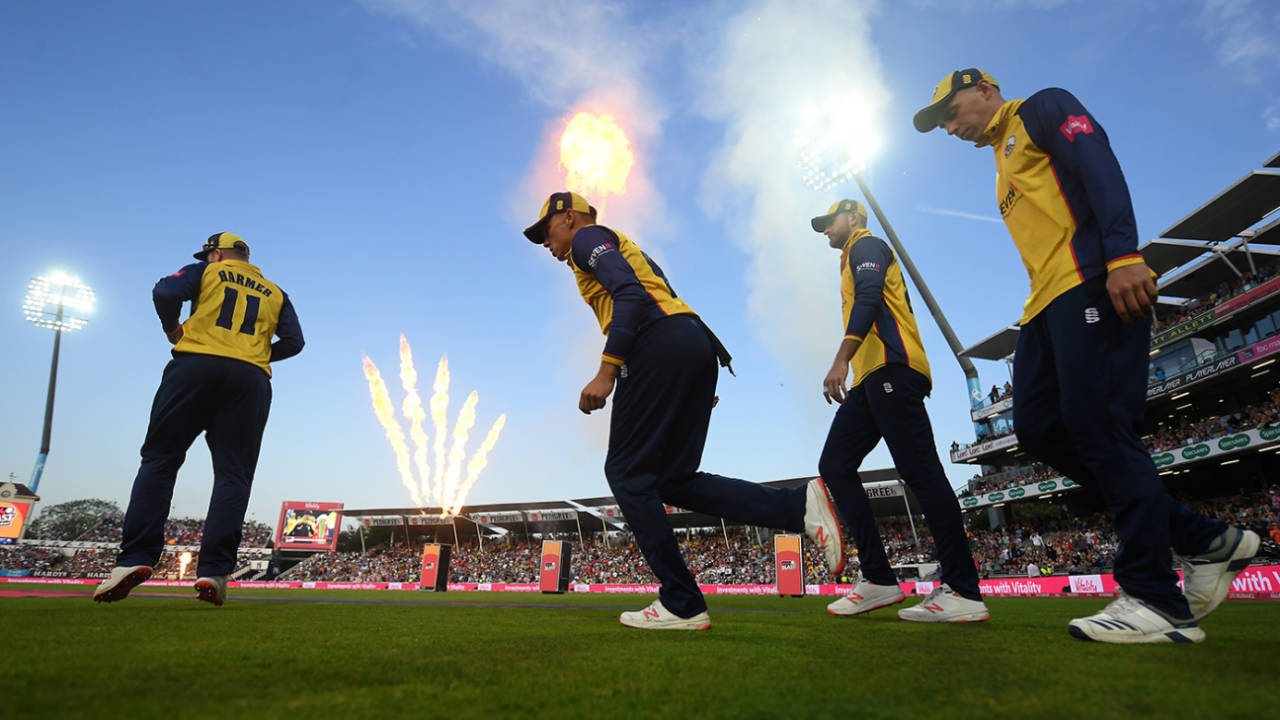ECB increases out-of-competition anti-doping tests with focus on short-form cricket
New data reveals rapid growth in number of drug tests administered on cricketers
Matt Roller
Mar 11, 2020, 1:50 PM
Essex walk out at the start of the T20 Blast final • Getty Images
The number of out-of-competition drugs tests administered on cricketers by UK Anti-Doping (UKAD) has grown tenfold in the past five years, according to new data obtained by ESPNcricinfo.
The new figures, revealed via Freedom of Information requests, demonstrate an increase in the total number of tests administered annually on cricketers under the ECB's jurisdiction from 126 in 2013-14 to 315 in 2018-19*, and confirm the governing body's increased efforts to ensure cricket remains a clean sport.
From 2013 to 2017, cricket was not considered a high-risk sport by UKAD, the national anti-doping body, but discussions two years ago and an increase in UKAD's capacity due to additional government funding led to cricket receiving a free 'public interest' test allocation. No player tested positive for any performance-enhancing substance in 2019.
Increased professionalism and an awareness that the proliferation of T20 leagues has enhanced the potential benefits of doping have both prompted the extension of the ECB's programme. This year, short-form cricket makes up a greater proportion of the English summer on account of the Hundred's inaugural season, suggesting that the number of tests administered will continue to grow.
"In 2019, we carried out 315 anti-doping tests with a primary focus on short-form cricket, where players may be tempted to use banned substances to increase power or to aid recovery," said an ECB spokesperson.
The data also reflects increased professionalism in the women's game. No anti-doping tests were administered by UKAD on female players until 2016-17, but 40 tests were administered last year.
The increase in the number of out-of-competition tests last year is particularly significant. Those tests, administered outside of the period from 6am on a matchday to one hour after a game's completion, can be administered with no advanced notice, anytime and anywhere. The total number of tests stayed steady last year, but a greater proportion of tests were administered on non-matchdays.
Anti-doping experts suggest that out-of-competition tests are significantly more likely to catch drugs cheats than in-competition tests. "Anyone who fails in-competition testing has to be pretty stupid or pretty incompetent because you know when the competition is," Ivan Waddington, an anti-doping specialist at the University of Chester, told Cricket 2.0.
The ECB screens players more often than any other national board, though the number of anti-doping tests in cricket remains low compared to other sports. In 2017-18, the Football Association collected 5128 samples, while 739 tests were carried out in the same season by the RFU.
"The ECB takes its anti-doping duties very seriously," said a spokesperson. "We work closely with UK Anti-Doping to run robust testing programmes, which reach across all formats of the game. Additionally, the International Cricket Council (ICC) ensure that all international teams undergo anti-doping testing.
"Our testing programmes runs alongside an annual preventative education programme with all players in the professional game, including academies.
"Working with UKAD, we are continually looking for ways to build on the current programme as we enter the 2020 season."
*Years running October 1 to September 31
Matt Roller is an assistant editor at ESPNcricinfo. He tweets at @mroller98
